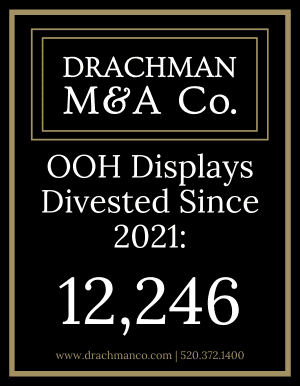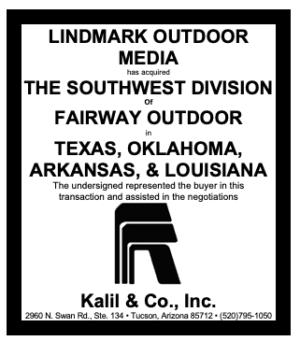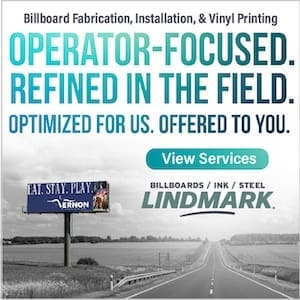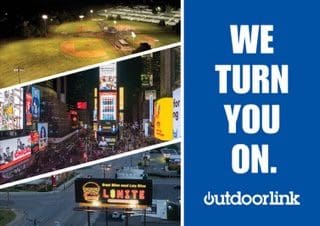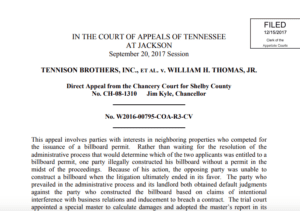 Constructing a billboard without a permit to block a competitor can lead to massive fines. That’s the lesson of Tennison Brothers v William H Thomas, Jr. Yes, that’s the same William H. Thomas who convinced a judge to throw out the state of Tennessee’s sign rules on a first amendment challenge in Thomas v Bright, a matter which was resolved earlier this week.
Constructing a billboard without a permit to block a competitor can lead to massive fines. That’s the lesson of Tennison Brothers v William H Thomas, Jr. Yes, that’s the same William H. Thomas who convinced a judge to throw out the state of Tennessee’s sign rules on a first amendment challenge in Thomas v Bright, a matter which was resolved earlier this week.
Here are the fact of Tennison Brothers v William H Thomas, Jr.
- Tennison Brothers owned property near the convergence of two interstate highways in Memphis Tennessee.
- In 2004 Tennison Brothers agreed to lease property to Clear Channel Outdoor to permit the construction of a billboard.
- A few days later, Southern Millwork, an adjacent property owner entered into a lease with William Thomas, Jr to permit Thomas to construct a billboard.
- Tennessee’s code required a 1000 spacing between signs so the two signs so only one sign could be constructed.
- Thomas submitted his application to the State of Tennessee first. The state’s rules are first come, first served. The lease in his application was not notarized. On August 27, 2004 the State informed Thomas that his application was being returned because the lease was not notarized as required by TDOT regulations. On that day Clear Channel Outdoor submitted a complete permit application which was approved. Thomas resubmitted his application with a notarized lease but the state denied the application because Clear Channel Outdoor’s permit was approved.
- When Thomas challenged the result an administrative law judge entered an initial order concluding that Clear Channel Outdoor’s application should have been rejected because the person who notarized the signature of the property owner also served as the real estate manager for Clear Channel Outdoor. The judge went on to rule that Thomas’s resubmitted application should be approved and that Clear Channel Outdoor’s permit should remain voided.
- Clear Channel Outdoor appealed the ruling to the TDOT commissioner and the initial order never became a final order and no permit was issued to either party.
- Thomas constructed a billboard in November 2005 without a TDOT permit.
- In March 5, 2007 the Administrative Law Judge issued a ruling that the TDOT permit should be granted to Clear Channel and that the billboard Thomas constructed without permit was illegal and should be removed.
- Thomas refused to remove the billboard, in effect blocking the Clear Channel Outdoor billboard.
- In 2008 Tennison Brothers filed a suit naming Southern Millwork and Thomas as defendants. The suit alleged that Thomas’s refusal to remove the billboard interfered with the planned construction of a billboard on Tennison’s property due to Tennessee’s 1000 foot spacing requirement. Clear Channel Outdoor also brought a proceeding stating that it was entitled to compensatory and treble damages because Thomas had intentionally interfered with a business relationship and that Thomas ‘s interference had caused a breach of contract.
- In 2009 a trial court granted a default judgement to Clear Channel Outdoor and Tennison Brothers.
- In 2013 a trial court awarded Tennison Brothers $1 million in lost lease income and treble damages and Clear Channel Outdoor $3.9 million in lost profits and treble damages. On December 15, 2017 the Tennessee Court of Appeals upheld the ruling.
What happened to Thomas? After the ruling he filed for bankruptcy.
[wpforms id=”9787″]
Paid Advertisement
